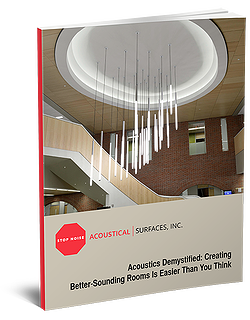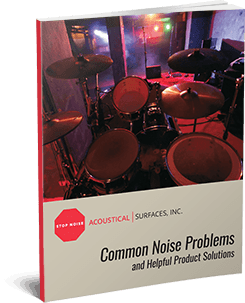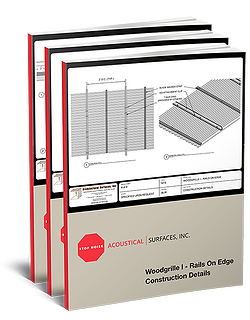The Potential of Blocked Rooms: Benefits of Soundproofing Techniques
Noise pollution can have some seriously negative ramifications on our health. Many of us are exposed to unsafe noise levels on a regular basis, and it isn’t doing us any favors. That’s why people all over the world are shoring up their sound defenses and enjoying the benefits of soundproofing. It’s having profound impacts on their lives.
In order to properly soundproof any space, it’s important to understand how sound waves work and how they invade our spaces. Only then can we devise a proper plan and begin enjoying the benefits of soundproofing for ourselves. But first, let’s take a look at some of the effects sound can have on our bodies and minds.
The Benefits of Soundproofing: The effects of noise on the body and mind
Too much noise is not good for us. There are both physical and psychological impacts of chronic exposure to noise, particularly sounds that measure over 85 decibels. Noise can wreak havoc on our stress levels and, if left unaddressed, can lead to significant hearing loss and other ailments down the road. Let’s take a quick look at some of the more damaging effects of noise exposure.
Hearing Loss
Many people don’t realize that loud sounds, even if they aren’t causing physical pain, can and will cause hearing loss over time. Very loud sounds can have an almost immediate, damaging effect, but even seemingly tolerable noise levels will damage our hearing over longer periods of exposure. Hearing loss can cause a host of other conditions as well.
Tinnitus
People with untreated hearing loss often experience tinnitus, which is a constant ringing sound in the ears. No ringing is actually present, but the damaged inner ear sends signals to the brain that register as a constant, high-pitched sound. Tinnitus can make communicating with our friends and family more difficult, and can even lead to trouble sleeping.
Trouble Sleeping
With that constant source of perceived sound, many people with tinnitus experience trouble falling asleep. If it’s severe enough, this can reduce the amount of quality sleep we get each night, which can snowball into conditions like depression, fatigue, memory issues, and lowered immune response.
Increased Likelihood of Developing Dementia
Lastly, scientific research has shown a link between untreated hearing loss and an increased likelihood of developing dementia. There is no clear consensus on why this is, but a study published by Johns Hopkins Bloomberg School of Public Health indicates that participants with moderate to severe hearing loss may have a 61 percent higher prevalence of dementia than those with normal hearing. Anyone who has ever experienced dementia in their families or friend groups knows how important it is to reduce your chance of developing this life changing condition.
Mental Strain and Stress
Exposure to noise can negatively affect our moods and increase stress levels. And if you know anything about stress, you already know that it can lead to a number of serious problems that affect everything from heart health to anxiety and depression. Noise also makes it more difficult to concentrate. This can have negative impacts at home and work alike.
The benefits of soundproofing our homes and offices
We’ve looked at some of the ways noise exposure affects our bodies and minds, so let’s shift to some of the physical and mental health benefits of soundproofing crucial areas like the home and office.
In the Home
Home is our respite from the outside world. It’s where we relax after a hard day of work and where we entertain family and friends on sunny summer Sundays. The fact that we rely upon it to provide the rest we need to be productive in our professional and social lives makes it an incredibly important focus for soundproofing efforts.
Excess noise in the home can result in increased stress levels and reduced sleep. If, for instance, a busy road sits right outside your bedroom window, the noise it creates can keep you up at night and prevent you from getting a solid night’s sleep. That excess noise can even make it more difficult for you to hear in conversation or your current streaming binge.
Reducing noise leakage between rooms or between indoor and outdoor spaces is an important part of beginning each day feeling healthy and rested. It allows us to get the solace and sleep we need to be productive for our families and coworkers or clients.
In the Office
The office is another arena where the benefits of soundproofing are vast. We spend a good chunk of our waking hours working, and the places we work can be the place where we are exposed to the lion’s share of the daily noise. The benefits of soundproofing here will affect everything from employee health to employee productivity and increased profits. Here’s why.
When we are exposed to noise for a good portion of the day, it can have negative effects on our mood, stress levels, and ability to focus. As noise exposure increases, we often become more irritable and less able to concentrate on the task at hand. Best case scenario, this leads to missed deadlines and higher operating costs. Worst case scenario, this combination of stress and lack of focus can lead to serious physical harm to ourselves or our coworkers.
Reducing noise in the office allows us to fully concentrate on the tasks at hand, reducing the likelihood of mistakes that could result in injury or lost business. Getting things done efficiently in a pleasant atmosphere reduces stress and positively impacts our moods and minds, as well as the business’ bottom line.
Noise challenges in the workplace
Certain types of workplaces can present a unique set of challenges, depending on what industry we work in. For example, places like restaurants and warehouses are filled with sounds we don’t often experience in too many other places.
In bustling restaurants, this may include the sounds of pots, pans, and plates clinking together amidst the din of diners chatting with friends and family. In a warehouse, this may mean loud machines turning out and packaging products. Each workplace represents a unique soundproofing challenge that would require a slightly different set of products to effectively reduce noise levels. Locations like these highlight the importance of tailoring soundproofing to specific spaces.
In any situation, the major benefits of soundproofing your business is that it will protect employees and help maintain pleasant relations with the neighbors. Accomplishing this involves understanding how sound passes from inside your establishment to the outside world and preventing it the best you can.

The Benefits of Soundproofing: How sound invades our spaces
With the negative effects of noise and the benefits of soundproofing apparent, it’s important that we find ways to reduce that exposure. Sometimes we can simply move away from the source of sound. But that doesn’t always work. When that noise invades our living and working spaces, we must find ways to eliminate, or at least reduce the noise that makes us miserable. Can sound travel through walls? Not if you don’t let it.
Add Acoustical Treatments
For most of the sounds that originate inside the space, like those of people talking or keyboards clacking, we can use acoustical treatments as a first step to bring the volume down. The reason those sounds get so loud is due to the way they reflect off surfaces. Reducing those reflections will reduce the ambient sound level in the space.
When sound waves come into contact with hard, reflective surfaces, they tend to bounce back in the direction they came from. This is what causes echo. If the echo hits another solid surface upon returning to the sound’s original source, it will bounce back again. As these waves bounce back and forth in the room, they become amplified through what is known as reverberation.
Both echo and reverberation can make communication difficult and boost the volume of the ambient noise within the room. Their prevalence or lack thereof demonstrate how room layout and soundproofing are intertwined. In order to remove them from the equation, we must utilize the right acoustical treatments in the right spots.
Introducing soft, porous surfaces into the room can help absorb sound wave energy and reduce reflections. Reducing the amount of noise in the room reduces the amount that could otherwise pass through walls, floors, and ceilings, making soundproofing much easier.
Increase mass and density
Next, one of the most effective ways to obtain the benefits of soundproofing is to add mass and density to your walls, ceilings, floors, and doors. The more mass and density a barrier has, the harder it is for sound energy to pass through.
If building the structure from scratch, utilizing brick or concrete in our exterior walls will go a long way. If working with an existing structure, we can easily add mass and density by sandwiching a layer of mass loaded vinyl (MLV) between two layers of drywall. As long as your structure is strong enough to handle the added weight, MLV and drywall can be DIY soundproofing solutions that deliver real results.
It’s rarely practical to add mass and density to existing doors with the current sound blocking technology, so choosing a new one is a better bet. The heavier the door, the less sound passage we will typically experience. Many interior doors are lightweight and hollow, making them entirely unsuitable for soundproofing applications. Replacing doors with something more substantial will help reduce sound passage.
Buy Better Windows
Windows can allow a lot of sound passage, but can’t be treated in the same way as walls and doors because we still want light to pass through them. The best solutions for reducing sound passage through windows are to either install a new set, which can be prohibitively expensive, or to install window inserts. Window inserts are custom cut to fit your existing window frames perfectly, delivering the additional glass pane and air gap that are required for windows to properly block sound.
Seal Windows and Doors
Much of the sound leakage through doors and windows occurs through gaps or cracks at the perimeter. Sealing them with acoustical caulk will provide a permanently flexible barrier that is as effective for soundproofing as it is for energy efficiency.
If you’ve got gaps between the door and frame that can’t be caulked without impacting its function, a door seal kit blocks a tremendous amount of sound. It mounts to the door and frame you already have, but effectively seals any gaps when the door closes.
Add Damping Materials
Sound damping is the process of converting vibrational sound energy into a small amount of heat energy. Since energy can neither be created nor destroyed, this is necessary to remove that vibrational energy and stop it from traveling through surfaces. Common damping materials include green glue and acoustic insulation.
Green glue is spread between two surfaces, typically drywall or plywood, and prevents the transfer of vibrations from one to the other. The role of insulation in soundproofing is to prevent reverberation in cavities within the wall. Both are fantastic options.
Decouple Surfaces
If you seriously need the benefits of soundproofing for a recording studio or for operating very loud machinery, decoupling surfaces works wonderfully. By removing pathways sound vibrations could use to traverse the surface, we can effectively stop them in their tracks. This option involves a considerable construction project, so be aware of that before you begin.
Use Quality Materials
Whichever options you choose to incorporate into your soundproofing plan, be sure to use quality materials if you want the best results. We can achieve some decent results with DIY materials, but you will face significant limitations of soundproofing if you choose to go that route.
In order to get the biggest benefits of soundproofing, it’s always recommended to work with a professional provider of quality materials. We have the knowledge and experience to recommend the best material for soundproofing your space on budget.





